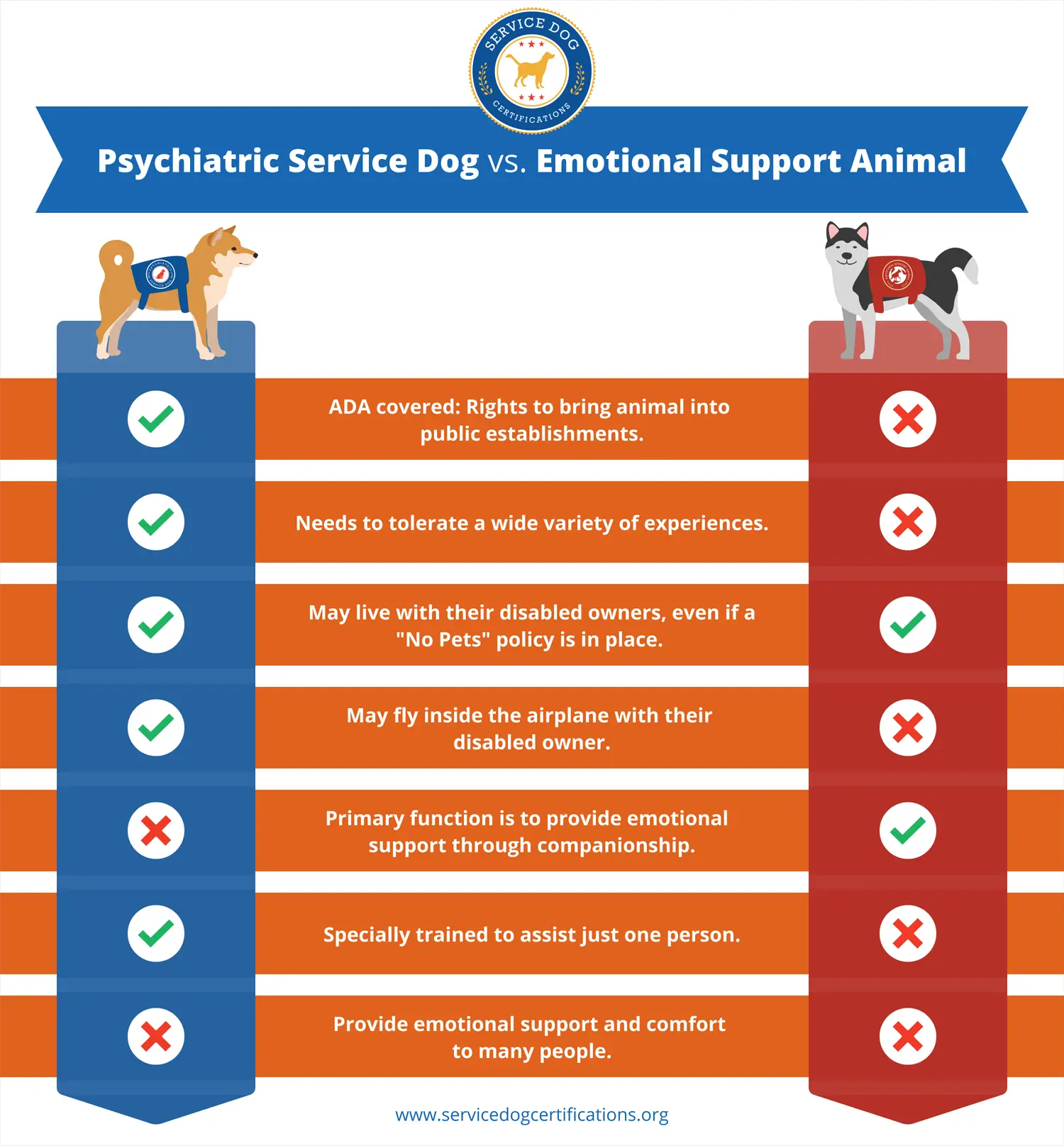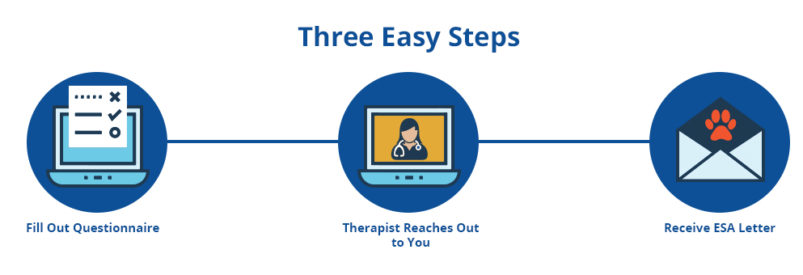Home Page › Blog › The Difference between a Psychiatric Service Dog and an Emotional Support Animal
The Difference between a Psychiatric Service Dog and an Emotional Support Animal

Dogs have historically performed all manner of tasks to assist humans in a variety of situations. For centuries farmers have used the intelligent and energetic nature of Border Collies to help them round up their livestock. Dogs are also incredibly useful in the treatment and therapy of various disabilities, both physical and mental. Perhaps the most well-known of these is the use of a specially trained dog to lead and assist its blind owner. However, dogs can be prescribed and recommended to patients to help treat their psychological disorders. There is often much confusion between the categories they fall under – Psychiatric Service Dogs and Emotional Support Animals. What are they exactly, and what are their differences?
If both categories are specifically aimed at alleviating the symptoms associated with various psychological disorders, how can they be differentiated? This question has led to many heated debates and confusion as to the rights of their owners and where the can and cannot bring their animals.
Share this image on your site
They both help to improve the mental health of their owners
As both Psychiatric Service Dogs and Emotional Support Animals are both provided to individuals to assist them in some way with psychological issues, it is easy to understand why some people may not understand the differences between them.
What is a Psychiatric Service Dog?
Dogs are commonly used to assist physically disabled people with everyday tasks, making their lives much easier than if they didn’t have them to help. These dogs are specifically trained to perform their designated tasks and behave considerably much better than typical pet dogs. All Service Dogs are protected under the Americans with Disabilities Act (ADA), allowing them to be exempt from most pet-related restrictions such as housing providers with a ‘no pet’ policy. This doesn’t apply only to physical disabilities, but to psychiatric disabilities as well. Psychiatric Service Dogs are therefore used by individuals whose mental impairment is so severe that it affects their ability to perform everyday tasks.
An example of this would be a mentally disabled person with a tendency to wander off in any direction when disoriented – a Psychiatric Service Dog would be trained and assigned to the individual to prevent them from walking onto busy roads.
What is an Emotional Support Animal?
While serving a similar service, Emotional Support Animals assist their owners as a part of their treatment plan. They do not assist individuals with everyday tasks, but rather they provide emotional comfort and help to improve the symptoms of certain psychological disorders.
The only physical aspect an Emotional Support Animal might provide, in contrast to a Service Animal, is that they may provide physical affection on command, or respond to playful activities. Emotional support animals do not have the same level of access as service dogs and are only allowed in planes for travel and in homes that normally do not allow pets.
How to get an ESA Letter Online
Federal Law sees both categories very differently
In the eyes of the law, it is only Service Dogs that are exempt from public restrictions for animals. For example, in usual circumstances, people are not allowed to bring their pets on board when flying on commercial airlines – they must transport them separately. However, the Americans with Disabilities Act stipulates that disabled individuals may travel with their certified Service Animals.
As Emotional Service Animals are merely assigned to people undergoing a therapeutic treatment plan or to provide emotional stability, and are not specially trained or certified, the ADA does not recognize them as a physical necessity. Therefore, Emotional Support Animals and their owners do not have the same overall rights as Psychiatric Service Dogs, although there are some exemptions.
While Psychiatric Service Animals may accompany their owners in public accommodation such as hotels, Emotional Support Animals may not. However, there are certain exceptions regarding private accommodation.
Many landlords and housing providers may often have a ‘no pets’ policy within their accommodation, but these policies can often be bypassed when it comes to Service Animals and Emotional Support Animals due to their prescribed therapeutic assistance to their owners.
Psychiatric Service Animals and Emotional Support Animals serve similar purposes, but have very different rights
While both Psychiatric Service Animals and Emotional Support Animals are prescribed to their owners to assist them with mental impairments, it is apparent that they are designated to serve different purposes. Individuals who have been diagnosed with a psychiatric disorder that is severe enough to impair their daily functioning will typically be assigned a Psychiatric Service Animal to assist them in their day to day activities, and are recognized by the ADA. By contrast, Emotional Support Animals do provide their owners psychological stability and therapy, but are not recognized by the ADA and therefore do not have as many rights under Federal Law.
About the Author: The writing team at Service Dog Certifications is made up of folks who really know their stuff when it comes to disability laws and assistance animals. Many of our writers and editors have service dogs themselves and share insights from their own experiences. All of us have a passion for disability rights and animals.
Latest Posts

How to Bring a Service Dog to Disneyland
Trained service dogs are more than welcome to join their handlers at Disneyland. In this guide, we’ll explain Disneyland’s policies and give practical advice for bringing a service dog to Disneyland for the first time. Disneyland’s Service Dog Policies The Magic Kingdom is happy to welcome trained service dogs across most park locations! They kindly […]

Read More

Can Dogs Eat Tomatoes?
Yes! Dogs can safely enjoy tomatoes, but there are a few risks to be aware of so you can feed your dog responsibly. Fully ripe tomatoes (without the stems and leaves) can actually have nutrients that are good for your pup. Tomatoes have chlorogenic acid, an antioxidant that can have anti-inflammatory effects in cells. They’re […]

Read More

Can a Primary Care Doctor Write an ESA Letter?
Your family doctor, also called a primary care physician (PCP), can write a letter recommending an emotional support animal. We’ll explain what legally gives them that ability and explore what better options might be available for you. Why are Physicians Able to Write an ESA Letter? To turn your pet into an emotional support animal, […]

Read More









This distinction will be moot shortly because the airlines are pushing to eliminate any rights for emotional support animals. The federal government is taking comments on changes to the ADA so that the airlines can charge for the animals. Comments are due by April 6, 2020. This is the link to comment on this change: https://www.servicedogcertifications.org/wp-content/uploads/2017/05/servicedog_ESA_therapydog.jpg
I am 16 and have sever anxiety, depression, and social anxiety that makes me have panic attacks. Do I need a service dog or emotional support dog?
That seems like a question that you should talk to your therapist and family about.
Jay, I don’t think that the operator of this site actually provides training. You can use this site to collect information about the differences between emotional support animals, therapy animals, and trained service animals. Truth be told, the documentation sold here is not required under the law, and does little to identify your animal’s training or legal status. It may smooth some interactions at some airline terminals or some rental facilities, where people don’t understand the laws around access to service animals, but that is about it. You should seek a local dog trainer to answer questions about obtaining a trained dog, or whether your puppy is a good candidate for training. There is nothing in the law that requires formal or professional training. What is clear is that the animal must be specifically trained to provide a service or complete a task that is directly related to your disability.
Can you train a dog that is already in the home? I am bi-polar and have PTSD, anxiety disorder and depression. Where would I go to have a dog or even my puppy trained for that a psychological service dog? Or would I need a emotional support animal letter? I need guidance for this. Would you please help me with this? Thank you.
Yes, There are some training facilities that provide Service Dog training for your dog, and some that provide both. Depending on the facility though, I recommend you double check and maybe send them an Email. If not keep searching! Don’t give up! if all else fails you can always train your dog yourself at home, then get it ADA certified.
Hope this helped, though its late!
Good Luck!
i think that every one with emotional struggles should have a support animal and because it makes them feel safe and it help to have something there to hug.
It does not make sense to me of an ESA. I people need not only emotional support at home but more so Outside of home. I have a little dog which gives me such confidence to socialize.Before if I was hungry I would go round and round and could not get myself to eat. I’d go home and spend all day without eating or eating some junk food. With my little dog I go into the restaurant (outdoor seating) and eat. I don’t qualify for service dog. ESA. But I need the support outside. Inside my home I’m safe. Confused